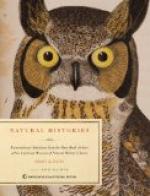Huber, for instance, informs us that the Fusca-slaves of the Sanguineas of Switzerland work with their masters in building the nest; they close and open the doors of the hive; but their chief office appears to be that of hunting for plant-lice. In England, on the contrary, the slaves are strictly household servants, rarely venturing out of doors. Such differences depend most probably on the fact that a greater number of slaves occur in Swiss than in English nests, and they may therefore be employed in a wider range of duties on the Continent than at home. A fewer number of slaves, a greater aptitude on the part of the slaves for their duties, the inability of the masters to perform the duties of the slaves—each or all of these causes combined would serve to increase the value of the servitors, and at the same time to reduce the independence of the masters.
This increase of the value of the slaves as active factors in the ant community might at length proceed to such extremes as we see exemplified in the Polyergus, already referred to—a race which has become literally unable to feed itself, and to discharge the simplest duties of ant existence, and whose actual life is entirely spent in marauding expeditions on the nests of its neighbors.
The subject of the general intelligence of ants, and of their ability to adapt themselves to awkward and unusual circumstances, may be briefly touched upon by way of conclusion.
Between the reason and intelligence of higher animals and the “instinct” of ants there is unquestionably a great gulf fixed. I make this statement unhesitatingly, notwithstanding that I should no more willingly attempt to define “instinct” than to give an exact definition of “insanity.” In the latter case one may make the definition so limited as practically to exclude all save one class of cases, or so wide as to include even the judge on the bench. In the case of instinct, the rigid definition of one authority might cause us to regard it as the exclusive property of lower forms and as having no relationship whatever with the mental powers of higher beings; or, on the other hand, as being but a modified form of, or in some respects identical with, these very powers. We know too little respecting the so-called “automatic” powers and ways, even of higher animals, to dogmatize




